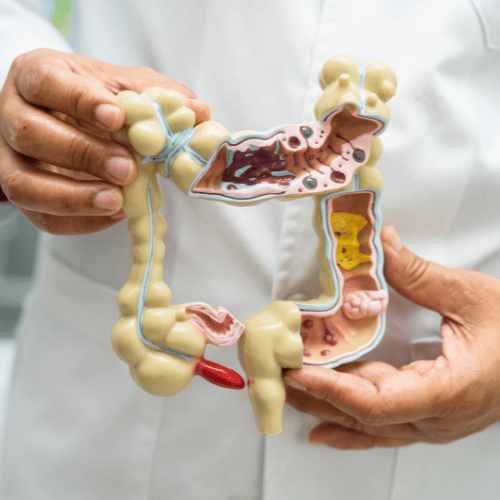
8 Best Herbs To Improve Gut Health
Our digestive system is like the engine that powers our overall well-being, and it’s responsible for much more than just processing the food we eat.
It’s a complex network of organs and processes that play a crucial role in our vitality.
A healthy gut isn’t just about avoiding stomachaches or bloating; it’s about ensuring that our bodies can absorb essential nutrients, defend against harmful pathogens, and maintain a balanced immune system.
It’s also closely linked to our mental and emotional well-being, with some calling the gut the “second brain.”
Unfortunately, modern lifestyles, processed foods, and stress can all take a toll on our gut health, leading to issues like indigestion, irritable bowel syndrome (IBS), and even more severe conditions.
But here’s the good news: nature provides us with a treasure trove of herbs that can aid in nurturing and maintaining a healthy gut.
These herbs are like natural allies that can assist our digestive system in staying in top shape.
Now, if you’re ready to explore these incredible herbs, learn about their unique properties, and discover how they can contribute to your gut’s well-being then let’s get started!
8. Ginger
Kicking off our list at number 8 is ginger, a remarkable root that’s been cherished not only for its culinary uses but also for its powerful digestive benefits.
Ginger is not just about adding a delightful zing to your dishes; it’s a natural remedy that has been used for centuries to address a variety of digestive discomforts.
One of ginger’s standout qualities is its ability to reduce inflammation in the gut.
Inflammation in the digestive tract can lead to discomfort, bloating, and even more severe conditions if left unaddressed.
Ginger contains bioactive compounds like gingerol, which have potent anti-inflammatory properties.
When you incorporate ginger into your diet, you’re essentially inviting these natural anti-inflammatory agents to work their magic in your digestive system, helping to calm inflammation and alleviate discomfort.
But that’s not all—ginger is a go-to remedy for nausea.
Whether it’s motion sickness, morning sickness during pregnancy, or nausea caused by digestive issues, ginger has been widely recognized for its anti-nausea properties.
It helps relax the gastrointestinal muscles, which can reduce the feeling of queasiness and the urge to vomit.
Moreover, ginger can be a digestive superstar. It stimulates the production of digestive enzymes and helps move food more efficiently through the digestive tract.
This means that it can assist in preventing indigestion, bloating, and gas by promoting healthy digestion.
So, whether you’re enjoying ginger in your meals, sipping on ginger tea, or even taking ginger supplements, you’re not just adding a burst of flavor; you’re inviting a natural digestive ally into your body.
7. Peppermint
At number 7, we have peppermint, an herb celebrated for both its refreshing taste and its impressive digestive advantages.
Peppermint has been cherished for centuries as a natural remedy for various digestive discomforts, and its popularity in this regard is well-founded.
Peppermint’s secret lies in its active compound, menthol.
This compound is known for its ability to relax the muscles in the gastrointestinal tract.
When these muscles are relaxed, it can lead to smoother digestion and significant relief from symptoms like indigestion and bloating.
Essentially, peppermint acts as a natural muscle relaxant for your digestive system.
Indigestion, often characterized by discomfort and a feeling of fullness after eating, can be alleviated with a cup of peppermint tea or by incorporating peppermint into your meals.
The soothing properties of menthol help calm the digestive tract, allowing food to move through more efficiently and reducing the chances of experiencing indigestion.
Peppermint can also help with bloating.
When the muscles in the gastrointestinal tract are relaxed, they are less likely to contract excessively and cause gas buildup, which is a major contributor to bloating.
Peppermint’s ability to relax gastrointestinal muscles and ease indigestion and bloating makes it a valuable ally for your digestive health and overall well-being.
6. Turmeric
Coming in at number 6 is turmeric, the golden spice with a wealth of health benefits, including remarkable advantages for digestive health.
Turmeric contains a powerful compound called curcumin, which has gained recognition for its potent anti-inflammatory properties.
Research has shown that curcumin can play a pivotal role in soothing the gut lining and reducing inflammation within the digestive system.
Inflammation in the gut can lead to a range of digestive discomforts and even contribute to chronic conditions.
A study published in the journal “Clinical Gastroenterology and Hepatology” explored the impact of curcumin supplementation on individuals with irritable bowel syndrome (IBS), a condition characterized by abdominal pain, bloating, and altered bowel habits.
The study found that curcumin supplementation significantly reduced IBS symptoms, including abdominal pain and discomfort, by modulating gut inflammation and promoting overall digestive comfort.
Additionally, another study in the “Journal of Medicinal Food” investigated the effects of curcumin on individuals with inflammatory bowel disease (IBD), a group of disorders marked by chronic inflammation in the digestive tract.
The study revealed that curcumin supplementation was associated with reduced inflammation and improved quality of life for individuals with IBD.
5. Fennel
At number 5, we’ve got fennel, an herb that has been cherished for centuries due to its remarkable digestive benefits.
Fennel seeds, in particular, have earned a well-deserved reputation as a go-to natural remedy for addressing a wide range of digestive discomforts.
Fennel’s digestive prowess can be attributed to its rich composition of natural compounds, with anethole being the key player.
These compounds work together to alleviate gas and bloating by relaxing the muscles of the gastrointestinal tract, allowing gas to pass through more smoothly.
This action leads to a noticeable reduction in post-meal bloating and the discomfort associated with it.
Additionally, fennel’s anti-spasmodic properties make it an invaluable choice for individuals grappling with irritable bowel syndrome (IBS), providing relief from the abdominal cramping and discomfort frequently experienced by those with IBS.
Fennel’s ability to alleviate gas, reduce bloating, and even provide relief from the symptoms of IBS makes it an adaptable and effective option for enhancing digestive wellness and overall comfort.
4. Chamomile
Number 4 on our list is chamomile, a gentle herb renowned for its calming properties and its effectiveness in soothing an upset stomach.
Chamomile tea, in particular, has been a cherished remedy for generations, known for its ability to provide relief from digestive discomfort.
The magic of chamomile lies in its natural compounds, including flavonoids, which have been studied for their anti-inflammatory and anti-spasmodic qualities.
Research published in the “Journal of Agricultural and Food Chemistry” highlights chamomile’s potential to reduce inflammation in the digestive tract, which can contribute to a soothing effect on the stomach and alleviate discomfort.
When you enjoy a cup of chamomile tea, you’re not just savoring a warm and comforting beverage; you’re inviting a natural solution for digestive ease into your routine.
Chamomile tea can help relax the muscles in your digestive tract, reducing spasms and cramping, making it an excellent choice for calming an upset stomach or alleviating symptoms of indigestion.
So, the next time you need a soothing and natural remedy for digestive discomfort, reach for a cup of chamomile tea and let its gentle properties, backed by scientific research, work their magic.
3. Dandelion
At number 3, we have dandelion, a remarkable herb that often goes unnoticed but offers significant benefits for digestive health.
Both dandelion greens and roots possess natural diuretic properties, making them a valuable addition to your dietary regimen.
These properties can play a pivotal role in promoting healthy digestion by reducing water retention and supporting the liver.
Dandelion’s diuretic effects can help the body eliminate excess water, reducing bloating and the feeling of being overly full.
By encouraging the removal of retained fluids, dandelion contributes to a more comfortable digestive experience, especially for those prone to water retention.
Furthermore, dandelion has been known to support liver health.
The liver is a key player in digestion, as it processes nutrients, detoxifies the body, and plays a crucial role in maintaining overall well-being.
Dandelion’s liver-supporting properties can aid in the efficient breakdown of nutrients and the elimination of waste products, thereby promoting optimal digestion.
Dandelion may be an unsung hero in the world of digestive health, but its contributions are substantial and well worth exploring as part of a balanced diet.
2. Aloe Vera
Coming in at the runner-up spot is aloe vera, a plant known for its multifaceted healing properties.
While aloe vera gel is commonly associated with soothing sunburn, its benefits extend far beyond skin care.
Aloe vera gel is a natural remedy that can be particularly effective in soothing digestive irritation and addressing various gastrointestinal issues, such as acid reflux and gastritis.
Aloe vera’s digestive magic lies in its gel-like substance, which contains compounds with anti-inflammatory and soothing properties.
When consumed, aloe vera can create a soothing and protective layer along the lining of the esophagus and stomach, helping to alleviate the discomfort associated with acid reflux and gastritis.
Research published in the “Journal of Traditional Chinese Medicine” has explored the potential of aloe vera in reducing symptoms of acid reflux.
The study suggests that aloe vera can help decrease the frequency and severity of acid reflux episodes, making it a valuable natural option for those dealing with this condition.
Furthermore, aloe vera’s anti-inflammatory qualities can help calm the inflammation often linked to gastritis, an inflammation of the stomach lining.
By reducing this inflammation, aloe vera provides relief from the burning sensation, pain, and discomfort associated with gastritis.
1. Meadowsweet
And now, for the top spot, we have Meadowsweet. Meadowsweet’s contributions to digestive well-being are nothing short of remarkable.
Research published in the “Journal of Ethnopharmacology” investigated the gastroprotective effects of meadowsweet.
The study found that meadowsweet extract exhibited protective properties against stomach ulcers and helped reduce the severity of gastric lesions.
This suggests that Meadowsweet’s soothing qualities can extend to gastrointestinal health.
Incorporating meadowsweet into your wellness routine, whether through herbal teas, capsules, or tinctures, can be a powerful way to support your digestive comfort and harmony.
Meadowsweet’s natural compounds, including salicylates and tannins, have long been recognized for their potential to alleviate indigestion, reduce acidity, and calm an upset stomach.
As the top herb for gut health, meadowsweet has earned its place by providing gentle yet effective digestive support.
It may not always make headlines, but its impact on digestive well-being is substantial and well worth exploring as part of your holistic approach to maintaining a healthy gut.
And there you have it—the eight best herbs to improve your gut health.
Incorporating these herbs into your diet, whether as spices, teas, or supplements, can be a natural and effective way to support your digestive system.
Remember to consult with a healthcare professional if you have specific digestive concerns or medical conditions.
Do you use any of these herbs regularly, and have you noticed improvements in your gut health?
Share your experiences and tips in the comments below, and let’s keep the conversation going!
Thanks for joining us today!









